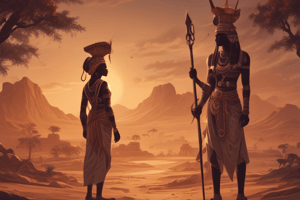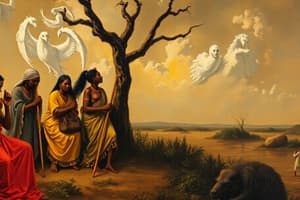Podcast
Questions and Answers
Who led the Ethiopian expedition into southern Arabia during the sixth century?
Who led the Ethiopian expedition into southern Arabia during the sixth century?
- King Solomon
- King Menelik II
- King Caleb (correct)
- King David
What was a distinctive feature of the Ethiopian liturgy?
What was a distinctive feature of the Ethiopian liturgy?
- Use of electric instruments
- Focus solely on scripture reading
- Incorporation of Western styles
- Dance as a sacred rite (correct)
How did the Ethiopian church differ theologically from the Roman and Constantinople churches?
How did the Ethiopian church differ theologically from the Roman and Constantinople churches?
- Remained Monophysite (correct)
- Followed a Trinitarian doctrine
- Adopted a dual-nature Christology
- Supported the Council of Chalcedon
What kind of monastic tradition developed in Ethiopia by the fifth century?
What kind of monastic tradition developed in Ethiopia by the fifth century?
What significant change occurred in the leadership of the Ethiopian church in 1951?
What significant change occurred in the leadership of the Ethiopian church in 1951?
What significant architectural feature is associated with Ethiopia's Christian heritage?
What significant architectural feature is associated with Ethiopia's Christian heritage?
What influence was prevalent in Ethiopia from the fourth to the seventh century?
What influence was prevalent in Ethiopia from the fourth to the seventh century?
What happened to Ethiopia's connections with the Byzantine Empire in the seventh century?
What happened to Ethiopia's connections with the Byzantine Empire in the seventh century?
What characterized the art of churches built by the ancient Nubians?
What characterized the art of churches built by the ancient Nubians?
Which titles in the Nubian royal administration reflected Byzantine influence?
Which titles in the Nubian royal administration reflected Byzantine influence?
What languages were likely used by the upper classes of Nubia?
What languages were likely used by the upper classes of Nubia?
By which century is it likely that the Nubian church came under the influence of Alexandria in Egypt?
By which century is it likely that the Nubian church came under the influence of Alexandria in Egypt?
What was a significant consequence of the Arab conquest of Egypt in 641 for Nubia?
What was a significant consequence of the Arab conquest of Egypt in 641 for Nubia?
What is noted about the Nubian church's continuity as a Christian entity?
What is noted about the Nubian church's continuity as a Christian entity?
What type of manuscripts did the Nubians leave behind?
What type of manuscripts did the Nubians leave behind?
How many episcopal sees did Nubia have at one point?
How many episcopal sees did Nubia have at one point?
What title did the king of Axum hold by the fourth century?
What title did the king of Axum hold by the fourth century?
Who were the key figures in the conversion of Ethiopia to Christianity?
Who were the key figures in the conversion of Ethiopia to Christianity?
What significant action did Ezana take regarding Frumentius and Edesius?
What significant action did Ezana take regarding Frumentius and Edesius?
What evidence indicates the conversion of Ezana to Christianity?
What evidence indicates the conversion of Ezana to Christianity?
What role did the queen play after the death of Ezana's father?
What role did the queen play after the death of Ezana's father?
By the last quarter of the fourth century, what was a common sight in Jerusalem?
By the last quarter of the fourth century, what was a common sight in Jerusalem?
What kind of nation did Ethiopia become by the middle of the sixth century?
What kind of nation did Ethiopia become by the middle of the sixth century?
What was a significant factor in the spread of Christianity in Ethiopia?
What was a significant factor in the spread of Christianity in Ethiopia?
What role did Tirhakah play in the events described?
What role did Tirhakah play in the events described?
Which event led to the Assyrians abandoning the siege of Jerusalem?
Which event led to the Assyrians abandoning the siege of Jerusalem?
What title was used in Nubia to refer to a reigning queen or queen mother?
What title was used in Nubia to refer to a reigning queen or queen mother?
What indicates the wealth of the Ethiopian Eunuch mentioned in the New Testament?
What indicates the wealth of the Ethiopian Eunuch mentioned in the New Testament?
What version of the prophet Isaiah was the Ethiopian Eunuch reading?
What version of the prophet Isaiah was the Ethiopian Eunuch reading?
What does the term 'Ethiopian' generally refer to in Greek context?
What does the term 'Ethiopian' generally refer to in Greek context?
What was a key characteristic of Tirhakah’s reign?
What was a key characteristic of Tirhakah’s reign?
What significant event does Acts 8:26-40 highlight about the Ethiopian Eunuch?
What significant event does Acts 8:26-40 highlight about the Ethiopian Eunuch?
What language were the scrolls found with the corpse of Timotheos written in?
What language were the scrolls found with the corpse of Timotheos written in?
Who was the patriarch that ordained Timotheos?
Who was the patriarch that ordained Timotheos?
Which city is associated with the ordination of Timotheos?
Which city is associated with the ordination of Timotheos?
What does the discovery of Timotheos' remains indicate about the Christian church in Nubia?
What does the discovery of Timotheos' remains indicate about the Christian church in Nubia?
What civilization was established by Semites from southern Arabia?
What civilization was established by Semites from southern Arabia?
What script did the Ethiopian language Ge'ez initially use?
What script did the Ethiopian language Ge'ez initially use?
What is considered a significant contribution from the ancient civilization in Axum?
What is considered a significant contribution from the ancient civilization in Axum?
When did Christianity begin to flourish in Ethiopia compared to Nubia?
When did Christianity begin to flourish in Ethiopia compared to Nubia?
Flashcards are hidden until you start studying
Study Notes
Nubia’s History
- Nubia was a powerful nation that was ultimately defeated by the Assyrians in 663 BC
- Nubians returned to Nubia and never again held power in Egypt
- The story of the "Ethiopian Eunuch" in Acts 8:26-40 places a Black individual as a proselyte in a chapter before the conversion of Paul and two chapters before Cornelius
- The text in Acts 8:26-40 indicates that this man, a royal treasurer, was from Nubia because he was described as the treasurer of the “kandake,” a title used in Nubia at the time to refer to the Queen Mother or Queen reigning in her own right
- The eunuch possessed a personal scroll of Isaiah in Greek Septuagint, which he read aloud
- Nubia had a distinct Christian tradition in the heart of Africa with churches, murals, and artifacts
- The Nubians wrote their own manuscripts and legal documents in Nubian script, some of which have yet to be deciphered
- The influence of the Byzantine Empire is seen in the Nubian court and administration with the use of Byzantine titles
- The upper classes of Nubia used the Greek language as well as the Coptic of Egypt and their own tongue
- Nubia existed as an independent entity with monasteries, cathedrals, and military forces as a barrier against Islam for centuries
- The discovery of the remains of Timotheos, bishop of Faras and Ibrim, in 1964 attests to the survival of a Christian church on the frontier of Christianity for almost 800 years
- The ordination document dated 1372-1380 belonging to Timotheos suggests that the Christian Church in Nubia persisted almost to the end of the Middle Ages
Ethiopia’s History
- Ethiopia converted to Christianity some 200 years before Nubia
- The civilization of the Ethiopian people started early in the 1st century AD
- The royal capital of Axum was a major center for the civilization, with evidence of its archaeological remains
- The Ge’ez language of the people received an alphabet and written form during this time
- Ethiopia had a written language with its own alphabet by the 2nd century AD
- Ethiopia traded with countries from the Mediterranean to the Indian Ocean, as well as the interior of Africa
- The Ethiopian kingdom expanded over parts of Nubia, northern Ethiopia, and parts of southern Arabia
- Ethiopia became a Christian country in the first part of the 4th century through the activity of Frumentius and Edesius, two Syrians who had been slaves at the royal court of Axum
- Frumentius is honored as a saint in both the Catholic and Ethiopian churches
- The conversion of Ezana and the royal court occurred under the influence of Frumentius and Edesius
- The Ethiopian kings had the title "king of kings" since they were the overlords of other kings in the area
- Christianity spread throughout the country, and by the end of the 5th century, it became firmly established
- Ethiopian pilgrims were frequent visitors to Jerusalem in the 4th century
- By the middle of the 6th century, Ethiopia was a powerful nation whose rulers were militant protectors of Christianity in neighboring areas
- Early 6th century, the Ethiopian king led an expedition to punish those responsible for the massacre of Christians at Najran in 523
- Ethiopia’s unique liturgy, derived from the Coptic liturgy of Alexandria, has its own characteristics in music, dance, texts, sacred rites, and art
- Ethiopia’s unique contributions to the Christian heritage include its own translation of the Scriptures, versions of several patristic texts, and a tradition of monasticism
- Ethiopia’s church was part of the patriarchate of Alexandria until 1951 when an Ethiopian was chosen as the head of the church
- Ethiopia, like Nubia, rejected the position of Rome and Constantinople in the Council of Chalcedon, making them Monophysites
- Ethiopia was a partner with the Byzantine Empire in the Red Sea area from the 4th to the 7th centuries
- With the rise of Islam in Africa in the 7th century, links with the Byzantine Empire were severed
- The Ethiopian church is a direct link to the early church
- Ethiopia’s unique culture and traditions made it a strong Christian center long before other countries, including Ireland, England, and Northern European nations
Studying That Suits You
Use AI to generate personalized quizzes and flashcards to suit your learning preferences.




